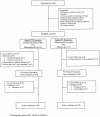A Randomized Controlled Trial of Ceftriaxone and Doxycycline, With or Without Metronidazole, for the Treatment of Acute Pelvic Inflammatory Disease
- PMID: 32052831
- PMCID: PMC8028096
- DOI: 10.1093/cid/ciaa101
A Randomized Controlled Trial of Ceftriaxone and Doxycycline, With or Without Metronidazole, for the Treatment of Acute Pelvic Inflammatory Disease
Abstract
Background: Anaerobic organisms are important pathogens in acute pelvic inflammatory disease (PID). The currently recommended PID regimen of a single dose of ceftriaxone and doxycycline for 14 days has limited anaerobic activity. The need for broader anaerobic coverage is unknown and concerns have been raised about metronidazole tolerability.
Methods: We conducted a randomized, double-blind, placebo-controlled trial comparing ceftriaxone 250 mg intramuscular single dose and doxycycline for 14 days, with or without 14 days of metronidazole in women with acute PID. The primary outcome was clinical improvement at 3 days following enrollment. Additional outcomes at 30 days following treatment were the presence of anaerobic organisms in the endometrium, clinical cure (absence of fever and reduction in tenderness), adherence, and tolerability.
Results: We enrolled 233 women (116 to metronidazole and 117 to placebo). Clinical improvement at 3 days was similar between the 2 groups. At 30 days following treatment, anaerobic organisms were less frequently recovered from the endometrium in women treated with metronidazole than placebo (8% vs 21%, P < .05) and cervical Mycoplasma genitalium was reduced (4% vs 14%, P < .05). Pelvic tenderness was also less common among women receiving metronidazole (9% vs 20%, P < .05). Adverse events and adherence were similar in each treatment group.
Conclusions: In women treated for acute PID, the addition of metronidazole to ceftriaxone and doxycycline was well tolerated and resulted in reduced endometrial anaerobes, decreased M. genitalium, and reduced pelvic tenderness compared to ceftriaxone and doxycycline. Metronidazole should be routinely added to ceftriaxone and doxycycline for the treatment of women with acute PID.
Clinical trials registration: NCT01160640.
Keywords: anaerobes; metronidazole; pelvic inflammatory disease.
© The Author(s) 2020. Published by Oxford University Press for the Infectious Diseases Society of America. All rights reserved. For permissions, e-mail: journals.permissions@oup.com.
Figures
Comment in
-
To Effectively Treat Pelvic Inflammatory Disease, Look Beyond Coverage for Gonorrhea and Chlamydia.Clin Infect Dis. 2021 Apr 8;72(7):1190-1191. doi: 10.1093/cid/ciaa103. Clin Infect Dis. 2021. PMID: 32052829 No abstract available.
References
-
- Hillier SL, Kiviat NB, Hawes SE, et al. Role of bacterial vaginosis-associated microorganisms in endometritis. Am J Obstet Gynecol 1996; 175:435–41. - PubMed
-
- Haggerty CL, Hillier SL, Bass DC, Ness RB; PID Evaluation and Clinical Health study investigators . Bacterial vaginosis and anaerobic bacteria are associated with endometritis. Clin Infect Dis 2004; 39:990–5. - PubMed


